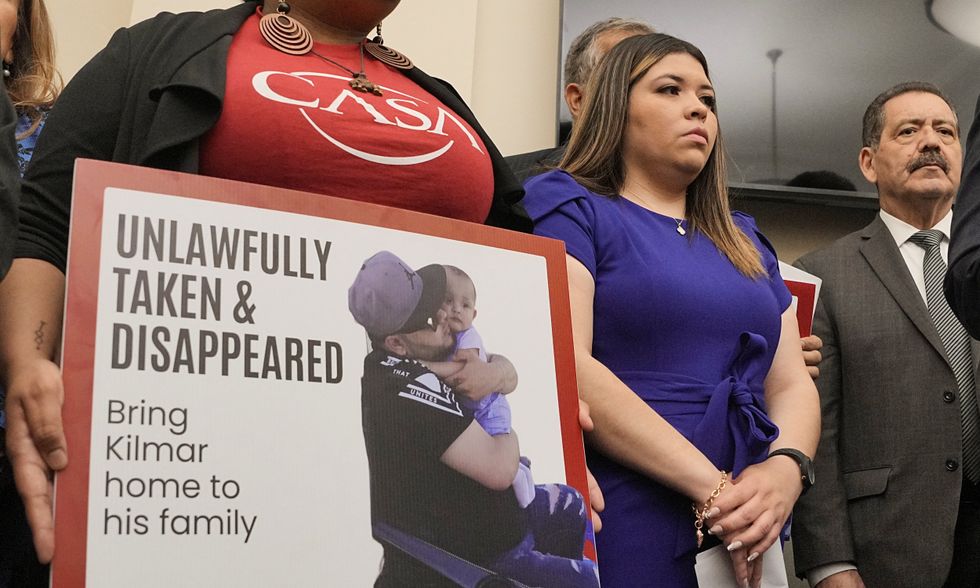

A former official in George W. Bush’s administration knocked the Justice Department over its response to a Supreme Court ruling that ordered the Trump administration to “facilitate” the return of a migrant who was wrongfully deported to El Salvador.
The conservative-leaning high court ruled that a lower court correctly ordered the Trump administration to “facilitate” Kilmar Abrego Garcia’s release from custody from a notoriously brutal Salvadoran megaprison and to “ensure that his case is handled as it would have been had he not been improperly sent to El Salvador.”
The case was sent back to the lower court, however, with the justices ruling, “the intended scope of the term ‘effectuate’ in the District Court’s order is, however, unclear and may exceed the District Court’s authority.”
ALSO READ: Violent J6er who broke into Capitol announces run for Congress in East Texas
Abrego Garcia’s lawyer celebrated, “The rule of law won today. Time to bring him home.”
But the Justice Department took a very different interpretation.
“As the Supreme Court correctly recognized, it is the exclusive perogative of the President to conduct foreign affairs. By directly noting the deference owed to the Executive Branch, this ruling once again illustrates that activist judges do not have the jurisdiction to seize control of the President’s authority to conduct foreign policy,” the Trump administration responded, via the Justice Department.
The DOJ statement caught the attention of Ed Whelan, former general counsel to the Senate Judiciary Committee and principal deputy assistant attorney general for the Office of Legal Counsel during the Bush administration.
“Supreme Court’s statement that district court ‘should clarify its directive’ that US ‘effectuate’ return of Abrego Garcia ‘with due regard for the deference owed to the Executive Branch in the conduct of foreign affairs’ is *not* a permission slip for Trump administration to do nothing,” he declared on X.
Whelan, who also served as president of the nonprofit Ethics and Public Policy Center for 15 years, noted that district courts cannot order the U.S. to “effectuate” return via “conducting military invasion.”
But they can do so in other ways.
“But where US has contracted with El Salvador for detention services, there is no meaningful intrusion on the ‘conduct of foreign affairs’ for court to order US to make best reasonable efforts to get detainee returned,” he wrote. “Supreme Court clearly contemplates that there is much that Trump administration can be made to do and that it ‘should be prepared to share what it can concerning the steps it has taken and the prospect of further steps.'”
Whelan accused the Justice Department of simultaneously trying to argue two conflicting ideas and overreaching by insisting efforts to return Abrego Garcia from a contracted prison in El Salvador is a high-stakes foreign policy matter that only the president can handle.
The DOJ argued that only the president can conduct foreign affairs as it’s an exclusive power, and that courts shouldn’t interfere. Whelan noted the DOJ is also saying that any interaction between the U.S. and another country is part of that exclusive foreign affairs power.
“DOJ can’t have it both ways,” he wrote, noting the court never said presidents have exclusive power over foreign affairs. “Congress obviously has lots of say over dealings with foreign countries (e.g., regulation of commerce with foreign nations, immigration laws). El Salvador here is functioning as a prison contractor for the US. Hardly a core matter of foreign affairs.”
Whelan then smacked down the DOJ’s argument that the courts ordering Trump to take “reasonable steps” to return a deported from a prison contractor amounts to an “invasion of the president’s prerogative over foreign affairs.”
That would mean, he said, pointing to Justice Sonia Sotomayer’s opinion, that the Trump administration ‘could deport and incarcerate any person, including U. S. citizens, without legal consequence, so long as it does so before a court can intervene.’
“That’s nuts,” he concluded, adding: “In their apparent zeal to pander to the White House, DOJ leaders continue to discredit themselves with the courts.”